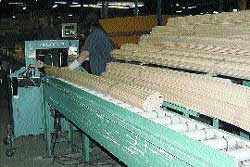January 29, 2014
Sometimes inspiration can strike with the force of a lightning bolt. At the Marion, VA, base of Marley Mouldings, that force is touching down twice. Marley Mouldings, a member of Toronto-based Royal Group of Companies since December, is this country's largest manufacturer of moulding and millwork made from polyvinyl chloride and polystyrene using a PVC cellular/foam extrusion process. Through this acquisition, Marley Mouldings' markets are expected to expand geometrically.
With a growing do-it-yourself market and a need to boost output to satisfy it, Marley Mouldings was already moving into higher gear before the deal was ever discussed. Its second goal–eliminating corrugated shippers wherever possible–folds right into this plan.
It isn't simple, for the materials, which are used in baseboard and other interior applications plus exterior millwork trim, range between 7 and 20 ft in length with equally variable counts and colors per load. The materials also require adequate protection through the shipping cycle. And Marley Mouldings is aware that distributors and retailers store the packages in a wide array of conditions. "At the time we installed the first automated line to crank up our output, we knew we'd have to move into something that would give us at least the protection of corrugated cases, but preferably without the volume of materials," PD learns from Marley prefinish plant manager Larry Wyatt. "When we saw there was the possibility of drastically cutting back on the shipper volume," he adds, "we really liked it."
Installed 15 months ago under the aegis of Unisource Worldwide, a Georgia-Pacific member, that packaging line is the first footprint on Marley Mouldings' path to growth. The second step, a line that virtually duplicates the first, is less than two months old.
|
Bundles of moulding materials, between 7 and 20 ft long, are strapped with banding at either end before heading by conveyor to a hf/f/s system. Trim seals are then made. |
The material replacing the corrugated construction is a high-tensile-strength, multilayer shrink film from the Shrink Packaging Division of Sealed Air, and acquired through Unisource. The film is applied by a modified Shanklin® Model F-1 form/fill/seal machine, and it's giving Marley Mouldings the kind of output it needs to keep ahead of demand.
Wyatt pegs production at 1,400 bundles/shift, with that level doubled as the new packaging line phases in. That will quadruple output; line operation by two people slashes labor costs, compared with the five needed in the days when bundling was manual.
"Best of all," he notes, "our corrugated use is way down. Right now, we've reduced our DIY inventory of shippers by about sixty-five percent. We expect to reach eighty percent before too long as the new line moves toward its capacity."
The first packaging line gets off to its start with manual loading of the product onto a Shuttleworth powered conveyor. This moves it through Ovalstrapping's 515 plastic banding machine for wrapping and tensioning at either end with a band, Polychem's Flexband® machine-grade polypropylene material.
For the new line, explains Unisource packaging sales manager Richard Dewey, Marley Mouldings tried something different. "We had acquired several Felins rotary stretch film wrappers for other uses, so we decided to try one of them on the new line. It seems to work well."
On this line, product is strapped with polyethylene-based 2-in.-W stretch film bands. The material, produced by StretchTape, adheres to itself even with a considerable product bulk and weight exerting stress against it.
For both lines, the strapped materials convey in a straight line into the Shanklin system. These horizontal continuous motion machines propel product into a belt infeed conveyor. Rather than the standard overlap static seal, they move the flat film from a machine-side roll supply toward side-seal jaws to form welded beam trim seals, repeating the function for end seals for a tighter-than-expected wrap.
Changes in product length, height and quantity are made efficiently on the touchscreen, run off a programmable logic controller. "With the second packaging line," Larry Wyatt opines, "we should be able to optimize the equipment's potential by scheduling like-length runs for more dedicated use of each machine."
Following cutting away of the trim, the finshed package conveys through Shanklin's Model T-72 heat tunnel to tighten the film, Sealed Air's Cortuff™ high-abuse shrink film, also acquired through Unisource. Though declining to discuss the specific gauge, a Sealed Air spokesperson does allow that it's a multilayer polyolefin. Easily meeting Marley Mouldings' tight requirements for breakage and tear resistance through distribution, the film has another big plus at the retail level–a water vapor transmission rate of 0.3 g/m/100 sq in./24 hr at 100-percent relative humidity at100 deg F, using the American Society for Testing & Materials test methods.
Prior to palletization, each bundle receives a 3 x 3-in. pressure-sensitive label with in-house-generated part number, dimensions and other information. Printed on a veteran printing machine no longer made or available, the labels are exactly the same ones Marley used on boxes. And, Wyatt says, there are pallet-utilization benefits of the new equipment: "We now get about a third more product per palletload." A 40 x 48-in. pallet that held 36 boxes now can accept 56 to 72 bundles, he adds. "And the inventory situation is getting better every day, with freed-up storage space."
More information is available:
Packaging line development/film/wrapper/strapper: Unisource Worldwide, 770/447-9000. Circle No. 222.
Film: Shrink Packaging Div., Sealed Air Corp., 800/845-7551. Circle No. 223.
Wrapper/tunnel: Shanklin Corp., 978-772-3200. Circle No. 224.
Conveyor: Shuttleworth, 219/359-7810. Circle No. 225.
Bander: Ovalstrapping, 256/845-1914. Circle No. 226.
Band: Polychem Corp., 440/357-1500. Circle No. 227.
Bander: Felins, 800/843-5667. Circle No. 228.
Band: StretchTape, 216/486-9400. Circle No. 229.
About the Author(s)
You May Also Like



